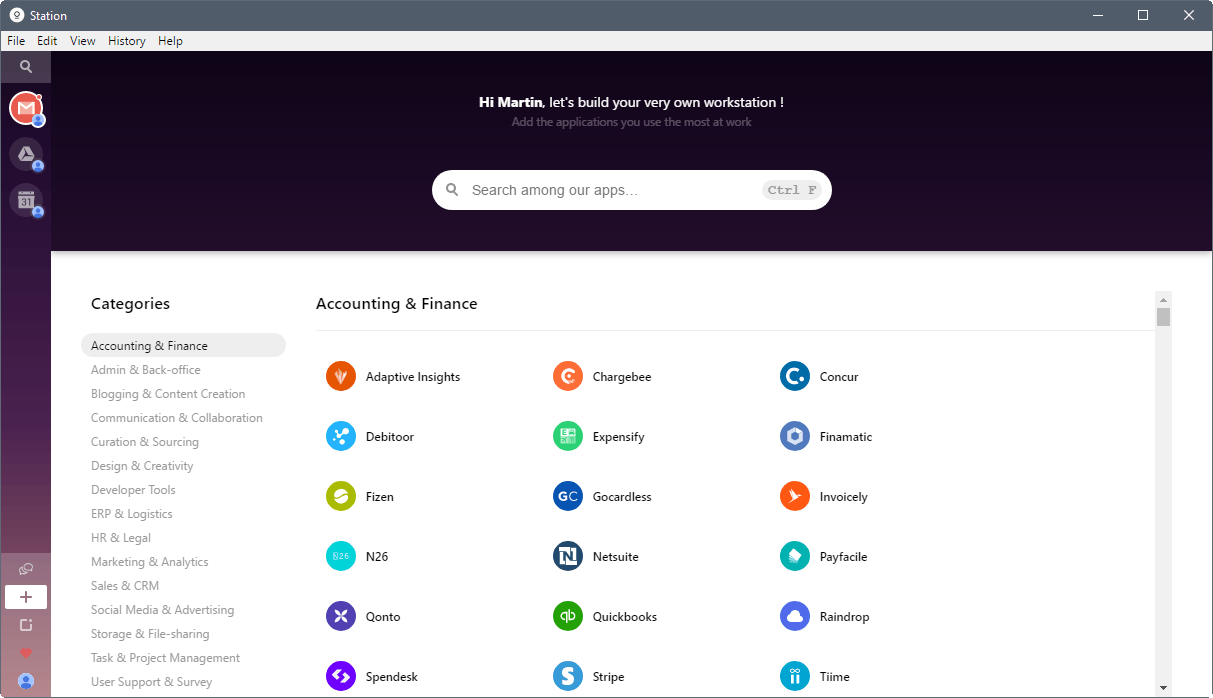Station: desktop workstation for Google Apps, Twitter, hundreds more

Station is a free desktop program for Microsoft Windows and Apple Mac OS X devices (Linux coming) that can best be described as a desktop workstation for web apps.
The application integrates hundreds of web services (apps) that you can all run from within the interface. While you are asked to get started by adding a Google Work account, you may then later on add apps from more than a dozen categories that include admin & back-office, marketing and analytics, and user support & survey.
You can bundle all your online activity in Station. Add Gmail, Twitter, and Facebook Messenger for social media and communication, Salesforce and LinkedIn, or Trello and Zendesk to Station with just a couple of clicks.
Station
It appears that you need access to a Google Apps account to use Station. This is the only requirement however, and once you have linked your Google Account to Station, you can start adding other applications.
Station lists all apps you use on a small sidebar, and you can switch between them easily.
Before you start using the software, you may want to know more about the business model and resource usage of the application. According to the startup behind Station, Station will remain free as a regular version. The company plans to create a version for Teams, and this one will generate revenue for the company.
Station is quite large, at 130 Megabytes, and it is certainly not the lightest application when it comes to resource usage. It idled at around 120 Megabytes of RAM on a 64-bit Windows test system with only three Google Apps added to it.
The developers note however that they have added a resource saving feature to Station which will iddle applications that are not used for some time to reduce the impact of it.
Station supports multiple accounts for a single service. That's handy if you manage multiple accounts, e.g. multiple Twitter accounts as you may add them all to the application.
The adding of apps to Station works pretty much as you'd expect it to. Select one of the applications with a click on the plus icon when you hover over it using the application browser or search.
The next step depends on the application in question. WhatsApp for instance displays the QR code that you need to scan with the WhatsApp application on a smartphone to link the account to Station.
Once done, you get access to all your WhatsApp contacts and conversations, and can chat with any contact or group using the interface.
The switch from one application to another is instant if the application is not idle. It takes a second or so if the application is idle however.
Closing Words
Station bundles web services in a single interface. That's excellent for a number of professions. As a webmaster, it allows you to add messaging, social medial, analytics, revenue generation and support apps in a single interface for instance.
It can be used for accounting and sales, project management, and many other activities that require access to multiple web services on a regular basis.
Why not use a browser to access the services?
Because sooner or later, web sites will diminish. Once their services are app-only, you’ll need this if you want to be productive on a workstation. Of course, as web sites diminish, so will the desktop.
Sad in a way, because I love the desktop/notebook environment, but companies need innovative ways to fine tune advertising. Speaking of which, @Gerard, don’t expect this to go away. Traditional forms of media are not getting advertisers the same return on the dollar as they used to get. Better reach is achieved when you can directly plug into that audience. Hence, sponsored apps.
Well the main advantage that Station offers is the bundling of services in a single interface. While you may be able to achieve the same with browser tabs, its interface seems more streamlined.
It more or less turns personal computers into terminals for web “services” and applications. That’s many a corporation’s wet dream. I wouldn’t touch something like this with a flagpole. To me it looks like a next step of the shameless data harvesting business. My advice: use as few web “services” as possible.
It falls into same category of “innovative” “apps” based on Electron; it’s a wrapper for web services just like Rambox and Franz.
Also, I can’t see its privacy policy.
interesting, but just wondering why i can’t find nothing more than the download link and no list of apps supported.